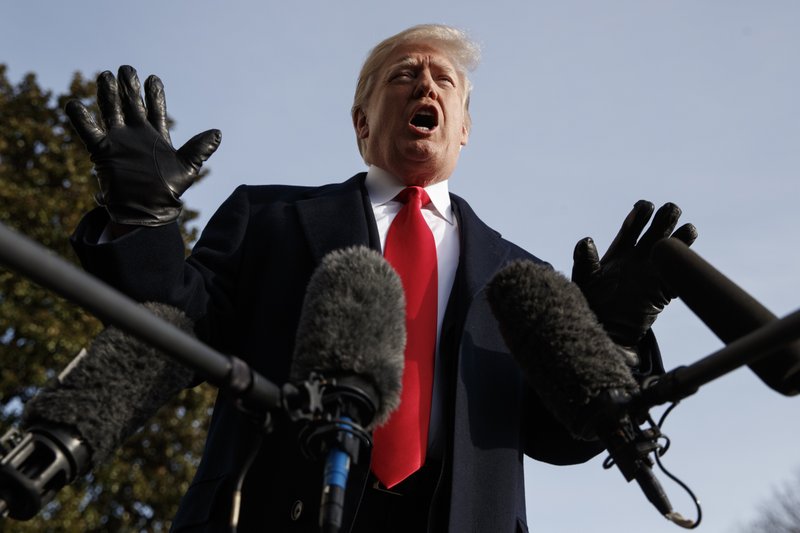WASHINGTON -- President Donald Trump asserted Monday that payments to buy the silence of two women about alleged affairs were not illegal campaign contributions, as federal prosecutors contend, but instead represented a "simple private transaction."
In morning tweets, Trump sought to counter assertions in a court filing Friday that he had directed his former personal lawyer, Michael Cohen, to pay the women in a bid to influence the 2016 presidential election.
Cohen pleaded guilty to charges in New York in August, saying that "Individual-1," identified as Trump, schemed to silence two women about affairs with the Republican candidate. Cohen acknowledged that such payments amounted to illegal campaign donations -- and said he arranged for them at Trump's behest.
In a sentencing memorandum filed Friday, federal prosecutors recommended that Cohen receive a substantial prison term.
In his tweets, Trump suggested that the payments were being scrutinized only because prosecutors have not been able to find evidence of collusion between his 2016 campaign and Russia. He also appeared to suggest that prosecutors are taking their cues from Democrats.
He further asserted that even if the payments could be considered campaign contributions, he should be facing a civil case rather than a criminal case.
"There was NO COLLUSION," Trump wrote. "So now the Dems go to a simple private transaction, wrongly call it a campaign contribution." In another message, Trump continued: "...which it was not (but even if it was, it is only a CIVIL CASE, like Obama's - but it was done correctly by a lawyer and there would not even be a fine."
And, he said, Cohen should be held responsible, not him.
"Lawyer's liability if he made a mistake, not me," Trump wrote. "Cohen just trying to get his sentence reduced. WITCH HUNT!"
At issue are the payments to two women who alleged sexual relationships with Trump before he ran for president.
In August 2016, Playboy model Karen McDougal reached an agreement with American Media Inc., publishers of the National Enquirer, that ensured she would not share her story about a lengthy relationship with Trump. In October of that year, adult film actress Stormy Daniels received $130,000 to similarly stay quiet about a liaison that she said had occurred a decade before.
Both of those agreements were facilitated by Cohen, as he admitted in court in August when he pleaded guilty to two campaign-finance charges along with other counts.
Prosecutors argue that because Cohen was an agent of the Trump campaign, the payments to McDougal and Daniels were campaign contributions in excess of federal limits and not unrelated expenditures.
"With respect to both payments, Cohen acted with the intent to influence the 2016 presidential election," Friday's filing from prosecutors in New York says. "Cohen coordinated his actions with one or more members of the campaign, including through meetings and phone calls, about the fact, nature, and timing of the payments. In particular, and as Cohen himself has now admitted, with respect to both payments, he acted in coordination with and at the direction of Individual-1."
Elsewhere, filings from prosecutors make clear that Individual-1 refers to Trump.
In trying to make the case that the payments to McDougal and Daniels should be a civil matter, rather than a criminal case, Trump pointed to a civil fine paid by President Barack Obama's campaign in 2013.
In April 2012, the Federal Election Commission released an audit of Obama's 2008 campaign that found that his committee did not disclose the identities of 1,312 donors responsible for nearly $2 million in contributions in the final weeks of the campaign.
Under federal election law, campaigns must file special notices to the FEC of last-minute contributions of $1,000 or more that are received in the final weeks before Election Day.
Eight months after the audit, Obama's campaign agreed to pay a $375,000 fine, which was one of the largest penalties in the agency's history.
Also on Monday, a judge set a court date this week for former Trump campaign chairman Paul Manafort after prosecutors with the special counsel's office detailed lies that they say he told them.
The scheduling conference will take place this afternoon before U.S. District Judge Amy Berman Jackson. It had earlier been set for Wednesday morning. Manafort is not expected to attend.
In a court filing Friday night, Mueller said Manafort had lied about contacts with Trump administration officials and with an associate who U.S. authorities say has ties to Russian intelligence.
Manafort's attorneys have denied that he made false statements.
Manafort pleaded guilty to conspiracy in September and agreed to cooperate with Mueller's investigation. But prosecutors say his deception has torpedoed that plea deal.
Information for this article was contributed by John Wagner, Philip Bump and Michelle Ye Hee Lee of The Washington Post; by Terrence Dopp of Bloomberg News; and by staff members of The Associated Press.
A Section on 12/11/2018
